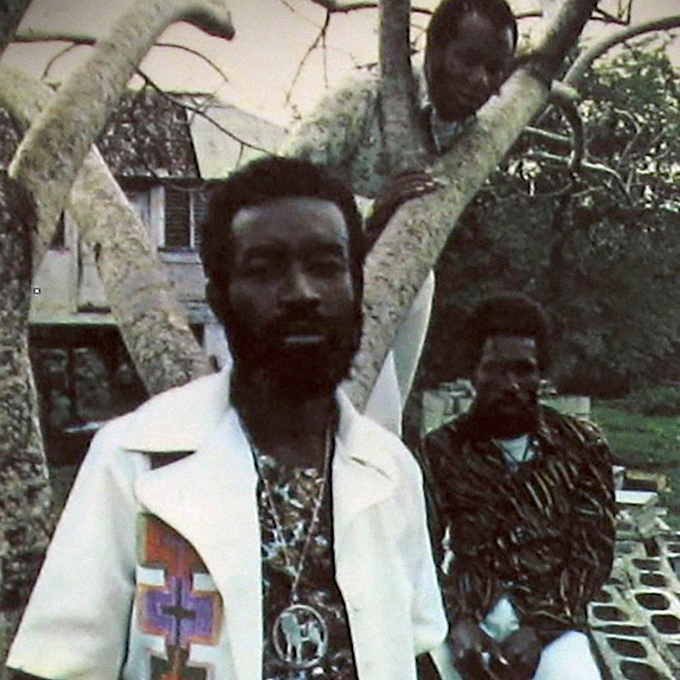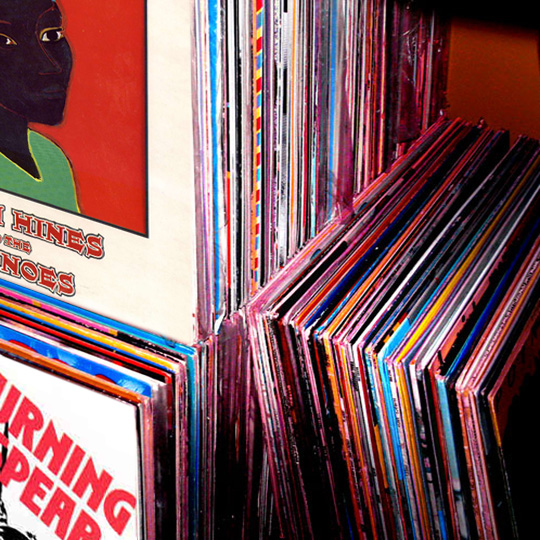The Sounds of St Ann
The parish of St Ann has a right royal roster of musical credentials, from Tanya Stephens attending Ochi Primary to... did someone mention the word ‘Bob’?
Jack Ruby
One of the great Roots Reggae producers of the 1970s, and the only major not based in Kingston, Lawrence Lindo aka Jack Ruby (pictured with Bob Marley) was instrumental in the success of artists such as The Heptones, Justin Hinds and Burning Spear, as well as running his successful Jack Ruby Hi-Fi Power sound system in Ocho Rios.
He left this earth in April 1989 but his influence continues. A plaza, a restaurant and a large colourful mural at the top of James Avenue bear his name, near the former location of his sound system. A campaign to officially rename the street ‘Jack Ruby Avenue’ is underway. Ruby was the grandfather of successful rapper/reggae fusion artist Sean Kingston.
A chapter of the eternally-watchable 1977 docu-movie, Roots Rock Reggae presents a casual Jack Ruby, Red Stripe in hand, auditioning singers in his yard.
Rockers, an essential Jamaican movie of the following year, features several riveting scenes of Ruby at work and play, and offers a brief glimpse of a pre-plaza Ocho Rios.
CHECK OUT: For some of the dark “haunting atmospheres” and vital roots Ruby sounds, we highly recommend the V/A compilations, Jack Ruby Presents The Black Foundation and Black Slavery Days (The Sound of St Ann's) from which this page borrows its title.
Bob Marley
“The music Bob created was so magnificent it has transcended all styles and now lives in its own space.” — David Rodigan
What more can we add to a life story as well documented as any in popular culture. Briefly then, Robert Nesta Marley popped out into the world with a rimshot on a Nine Mile farm on 6 February, 1945. At the age of 12, he moved with his mum to [a government yard in] Trenchtown, Kingston.
His earliest recordings from February 1962 included the sprightly and uplifting ‘Judge Not’ and ‘One Cup of Coffee’. The following year a teenage band was formed, negotiating several name changes till settling on The Wailers. A single ‘Simmer Down’ was a Jamaican ‘smash’ reaching #1 in February 1964; the debut album The Wailing Wailers followed in 1965. After signing in 1972 to the intrepid and influential Chris Blackwell’s Island label, and despite a major personnel change, the band grew over the next few years into a global sensation, with Bob himself rising to rarefied adulation as *the* champion of Reggae and emissary of the Rastafari faith.
A life cut tragically short, Marley made his solo exodus into the heavenly homeland on 12 May, 1981. The shrine at Nine Mile, his former boyhood home and subsequent mausoleum, is a fitting focal point to the undying reverence for His Royal Bobness.
CHECK OUT: If you are reading this, you probably rate the squillion-selling Legend compilation already, but all of the 1972-1980 Island/Tuff Gong albums are required listening, the following in particular in our opinion: Catch A Fire from 1973 (find the deluxe with the bonus untampered early version), Live! from 1975 captures a ‘you are there’ Lyceum vibe, and Exodus from 1977, voted Time magazine’s ‘Best Album of the 20th Century’. Then work backwards to 1962.
Burning Spear
Winston Rodney to his mum, Reggae legend Burning Spear was born in St Ann’s Bay on 1 March, 1945. The Burning Spears the name of his band, he adopted the name for himself after they split up in 1976.
Highly revered and influential Roots Reggae with a deep Rastafari message, international breakthrough came with the 1975 Jack Ruby produced Marcus Garvey and Man in The Hills albums on Island Records.
He has won two Grammy Awards for ‘Best Reggae Album’, Calling Rastafari in 2000 and 2009’s Jah Is Real, and nominated for an astonishing further twelve. In October 2007 Burning Spear was awarded the Order of Distinction in the Jamaican honours system.
CHECK OUT: Good kick-off points are the Marcus Garvey album and its laid-back follow-up, Man In The Hills. The earthy and spacey Living Dub Volumes 1 & 2 — which are Dub versions of Social Living and the spiritual Hail HIM — will put dumplings in your stew.
Justin Hinds
Born on 7 May, 1942 in Steer Town. Hinds began a long career in music singing around Ocho Rios in the bars and on the beaches for a spell before moving down to Kingston where, with his vocal trio of old school friends The Dominoes, he worked his way up to become one of the most popular and prolific Jamaican artists of the 1960s.
Justin Hinds & The Dominoes scored with the 1963 Ska anthem ‘Carry Go Bring Come’ for Duke Reid’s Treasure Isle, notching up a further seventy sides for the label between 1964-1966. As Ska merged into Rocksteady more hits followed including ‘The Higher the Monkey Climbs’, a Jamaican #1. The band’s success spilled over into the 1970s and a few excellent albums, notably the 1976 Jack Ruby production, Jezebel, were released sporadically up until 1992.
At the close of a musical career spanning four decades, Justin Hinds passed away in Steer Town in March 2005, aged 62.
CHECK OUT: For an overview of Hinds’ Treasure Isle era of Ska through Rocksteady to the early Reggae years, get hold of the Carry Go Bring Come: Anthology ’64-’74. The aforesaid Jezebel reunited the Dominoes in 1976 on an album of Ruby quality spawning several singles. Travel With Love, another Dominoes regrouping from 1984, is rootsy and often achingly beautiful.
Shabba Ranks
Pre-eminent Dancehall artist of his generation, Shabba Ranks was born Rexton Gordon on 17 January, 1966 at Sturgetown.
Distinctive by his gruff vocal style, his main period of global success kicked off in the late 1980s and continued through the ’90s. Since then he has released the odd single and the Shabba Ranks & Friends compilation album.
Romain Virgo
Singer in the ‘Lovers’ Rock’ style, Romain Virgo (pictured) was born in Stepney on 24 January, 1990.
Rising from early performances at the local church to fame via TV talent shows, he released his first album RV in 2010. By the time of his third album Lovesick in 2018, he had achieved international success and his first #1 on the Billboard Reggae Albums chart.
A Brief Guide to Jamaican Music
The sound of Old Jamaica, an original folk music played on acoustic guitar, banjo, hand drums and rhumba box, with topical, often bawdy lyrics.
Often mixed up with the not-dissimilar Calypso from Trinidad & Tobago, Mento saw a surge in appeal in the late 1940s, being performed at events and parties.
CHECK OUT: The Jolly Boys, Lord Composer, Lord Flea, Trojan Presents Mento & R&B
Upbeat, exciting and made for dancing! With origins in Mento, mixed with Jazz and R&B, Ska became the new sound of the new independent Jamaica in the early ’60s.
Traditional Ska bands featured bass, drums, guitars, organ, and horns such as sax and trombone.
CHECK OUT: Laurel Aitken, Prince Buster, The Skatalites, Byron Lee & The Dragonaires, Justin Hinds & The Dominoes
Sneaking into the mid-’60s as a sort of half-speed Ska, Rocksteady has a slower, laid back beat for more relaxed dancing, as opposed to the wild Ska ‘skanking’.
This golden period roughly covering the years ’66-’69 was a major step towards the emergence and sound of Reggae.
CHECK OUT: Desmond Dekker, Alton Ellis, Phyllis Dillon, Trojan Rocksteady Box Set
The music most associated with Jamaica rose up through the haze of the late 1960s. This deep, earthy music is characterised by a heavy backbeat with the emphasis on bass and drums.
CHECK OUT this lot just for starters: Jimmy Cliff, Culture, Burning Spear, The Abyssinians, The Congos, Bob Marley & The Wailers, Jacob Miller, The Heptones, Third World, Morgan Heritage, Queen Ifrica, Raging Fyah, Jah9, Koffee
A genre of Jamaican music that originated in the late 1970s, Dancehall began in large halls or spaces where DJs set up their sound systems. Simply put, a DJ ‘toasts’ (‘raps’) over a ‘riddim’. As Toasting grew in popularity, many DJs became names across the music world.
Today’s Dancehall, more pop-like and melodic, is a big part of the mainstream.
CHECK OUT: U-Roy, Yellowman, Beanie Man, Lady Saw, Mavado, Mr Vegas, Popcaan
A sub-genre of Reggae, usually instrumental remixes of existing recordings with stripped-down vocals and thickened-up drum and bass parts; with added sound effects, other instruments and lots of reverb.
Often wonderfully dark, spacey and ethereal, many Dub ‘Versions’ of songs and entire albums were released.
CHECK OUT: Keith Hudson, Lee “Scratch” Perry, King Tubby & Errol Thompson, Augustus Pablo, Scientist, This Is Trojan Dub
A descendant of the love songs of Rocksteady and early Reggae (and no relation to ‘Rock’ music at all), Lovers’ Rock slinked into the mid-1970s London Reggae scene to counter the more ‘masculine’ Rastafari roots.
Crossing the ocean back home to Jamaica, Lovers’ Rock was embraced effectively by many established artists.


















